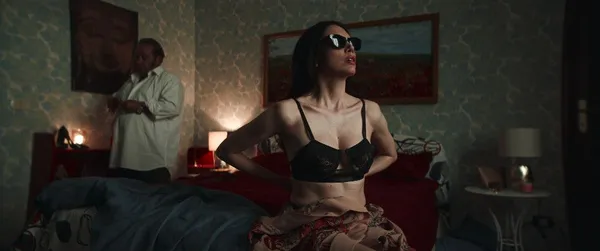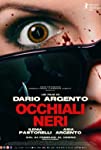Eye For Film >> Movies >> Dark Glasses (2022) Film Review
Dark Glasses
Reviewed by: Jennie Kermode

A vicious killer. Great gouts of blood spilling onto the ground. A beautiful woman in peril. The ingredients are familiar but, as always, the magic is in the way they are combined. This is Rome in the hot sun, in the inky black night, and caught in between, on the day of an eclipse. They say that if one gazes at such an event without protection, one will go blind. All that Diana (Ilenia Pastorelli) has to shield her eyes with is a pair of dark glasses, and surely enough, just hours later, she is caught up in a car crash, suffering a traumatic injury which robs her of her sight.
The arrival of a new Dario Argento film is an event. This one precipitated more excitement than almost any other film in the 2022 Fantasia International Film Festival line-up. It’s his first work for a decade, and now that he’s 81, one has to accept that it may well be his last. It seems fitting, then, that it marks a return to some of the preoccupations of his early work: the unlikely coincidences which mark out the Gothic; the connection between humans and animals; and the ability of disabled characters to forge their own paths through the type of scenario from which they were historically excluded. In this instance, one might even survive.
Argento himself has lost none of his vision. The colour saturation in these images is simply delicious. Gorgeous costume work by Guido Bongiorno makes the most of it, and Rome itself seems to have set out to please. it’s not just the architecture (Argento steers away from famous ancient buildings but brings out all the beauty in those from a century or two ago), or the luxurious interior décor, cars etc. which its characters enjoy – the sky and the trees pose for the camera. Canting that camera upward as we drive through the streets in the opening scene, Argento promises an experience which will beguile the senses, whether or not it delivers.
This is, in its way, close to the subject of the film. As a high class call girl, Diana makes her living first and foremost by appealing to the eyes. She is unsettled, of course, by her sudden blindness, which requires a lot of adjustment. Rita (an unusually dressed-down Asia Argento), her support worker, explains that it’s this process which is scary and that she can still live a full life. Regular clients are supportive, helping to restore her confidence, yet although she continues to be positioned as a beautiful object when in their company, elsewhere she seems to develop more agency, or more awareness of her agency. She is by no means a passive victim.
Two things besides the blindness dominate Diana’s life at this time. The first is her concern for the other survivor of the accident, a young boy named Chin (Andrea Zhang) who has lost his parents and been placed in the custody of nuns. naturally, he is eager to escape, and plays on Diana’s guilt as a means of doing so, but a real bond quickly begins to form between them. The second is the fact that the man who was chasing her in his van at the time of the accident – probably the same man who stalked her beforehand and quite possibly the same man who has killed three other sex workers in the city – is still after her. Rita arranges (with startling speed) for her to get a dog, Nerea, who will be her guardian and guide, but despite some interaction with the police (who are searching for the absconded boy), she has no other protection.
There is not a great deal of mystery here. You may well figure out who the killer is as soon as he appears. The style is what matters, and the gradual peeling away of all Diana’s systems of support, which happens in concord with the peeling away of that glamour and a shift to a much more primitive, unforgiving environment. We get hints of this earlier on – brief cutaways to a drab, dimly lit room where an largely unseen figure does cocaine and watches giallo on TV. The two worlds are destined to collide in a tangle of resentments which position our heroine as a person caught between society’s wealthiest people and its outcasts. A police officer expresses doubt about Diana’s disability, roughly shoving her aside. Denied the shelter of either privilege or community, she must fend fer herself, even at a stage when she needs to learn how to accept support.
Pastorelli is a charismatic lead, present in almost every scene, but Argento does not rely on this: events move along at a pace which seems languid yet never allows the viewer time to get bored. Only during the final chapter does the pacing feel a little off. There’s a break with tradition as we spend relatively little time with detectives. There’s also very little on-camera killing. What we do see is more powerful because of it. The film feels more intimate than most of Argento’s previous works, more personal, and as such it acquires a different kind of coherence.
It is not his finest work and may not be remembered as one of the classics, but it shows very clearly that he still has what it takes, and it is still a cut above most similarly themed films. Even when it gets ugly, you won’t want to look away.
Reviewed on: 01 Aug 2022

















